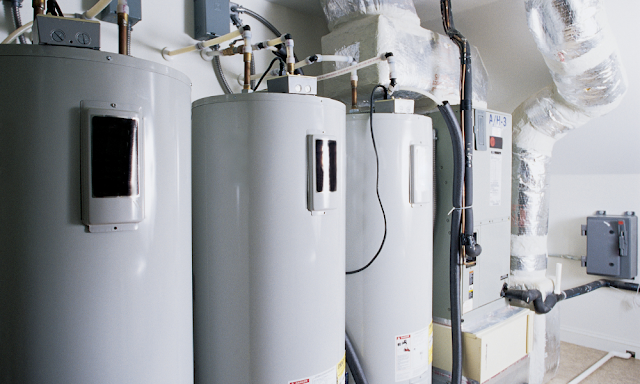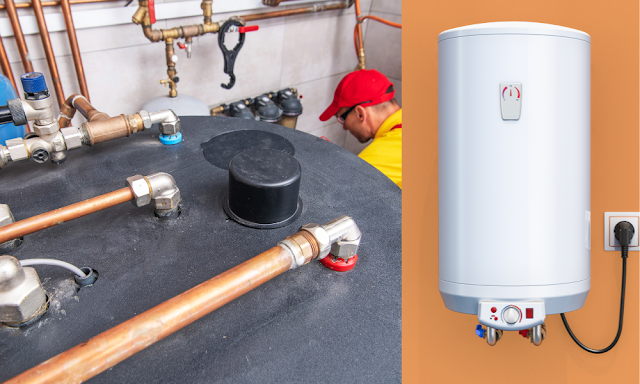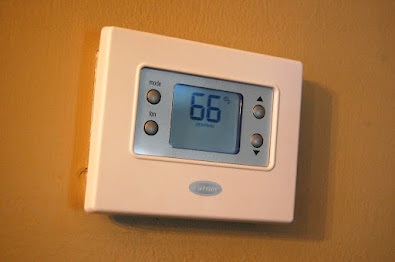Tank vs Tankless Water Heaters: Which is Best for Your Home?
A tankless water heater uses electricity to heat the water right away. As soon as hot water is needed, the water heater starts heating it right away. Most tankless water heaters are connected directly to the main hot water supply line. A thermostat regulates how much energy the water heater uses.
 |
| Tank vs Tankless Water Heaters |
In a traditional water heater, a small tank contains hot water. Hot water is transferred into the large tank. As soon as the water level in the tank falls, hot water is drawn into the tank. A cold water inlet is connected to the cold water supply line. The water moves through the tank and the pipes to the faucets. Hot water can be drawn into the cold water inlet whenever someone wants hot water.
A tankless water heater delivers hot water directly to the faucet. Instead of transferring hot water to a tank, a tankless water heater is plugged into the water supply line, and water flows right through the water heater.
 |
| Tankless water heater |
Many people who choose a tankless water heater are interested in saving energy and money. Tankless water heaters can use less energy. For example, a tankless water heater is plugged into the water line when someone needs hot water. When the faucet is turned on, the water heater turns on.
How To Choose The Right Water Heater For Your Home
Choosing the right water heater for your home is a challenging task. You need to know what your requirements are. You should also be careful when buying one. Consider the size of your home and the water you use at once. Then you need to look for a water heater that matches your heating system.
 |
| Water Heater |
1. Consider the Type of Water Heater
When choosing a water heater for your home, it's crucial to determine which type is best for you. Common types include gas, electric and tankless heaters. Different water heaters may be more beneficial depending on where you live and what type of climate you have. Gas is typically more cost-effective in your area, but electric is better if you want a smaller, sleeker design or if there needs to be access to natural gas near your home.
2. Determine Your Home's Hot Water Requirements
It's important to consider how much hot water will be needed in your household when selecting the right water heater. If you have multiple people living in the house that require frequent hot showers and baths, you'll need a model with a larger capacity than if you only use hot water occasionally. This ensures that the unit will only run out of hot water after everyone is done with their shower or bath.
3. Check for Energy Efficiency Ratings
Knowing the energy efficiency ratings of different water heaters can help you make an informed decision when purchasing one. Tankless water heaters are more efficient since they don't require storing hot water or warming it multiple times a day as tanks do. Look for a model with good ratings from Energy Star or other accredited organizations.
4. Compare Models and Prices
It would help you compare models and prices before buying to find the best value for your particular needs and budget constraints. Do some research online prior to heading out to local retailers so that you can compare prices across various brands ahead of time rather than relying on store clerks who might need to be more knowledgeable about these products or knowledgeable about competitors' offerings too.
5. Installation Requirements & Costs
Check with local authorities regarding building code regulations surrounding installation requirements before committing to having new equipment installed in your home.
6. Size and Capacity
Size and capacity are important factors when selecting the right water heater for your home. You want to look for a water heater that is large enough to handle your hot water needs but also not too big, so you save energy on unnecessary energy costs. Ideally, the tank size of your water heater should be at least 20-40 gallons, based on a survey done by Consumer Reports.
In conclusion, tankless water heaters are an exciting option for those who want to save energy and money. They provide a more efficient, consistent heat than traditional tank heaters. However, they may not be the best choice for those who want to use large amounts of water each time they need to heat their home.



Comments
Post a Comment